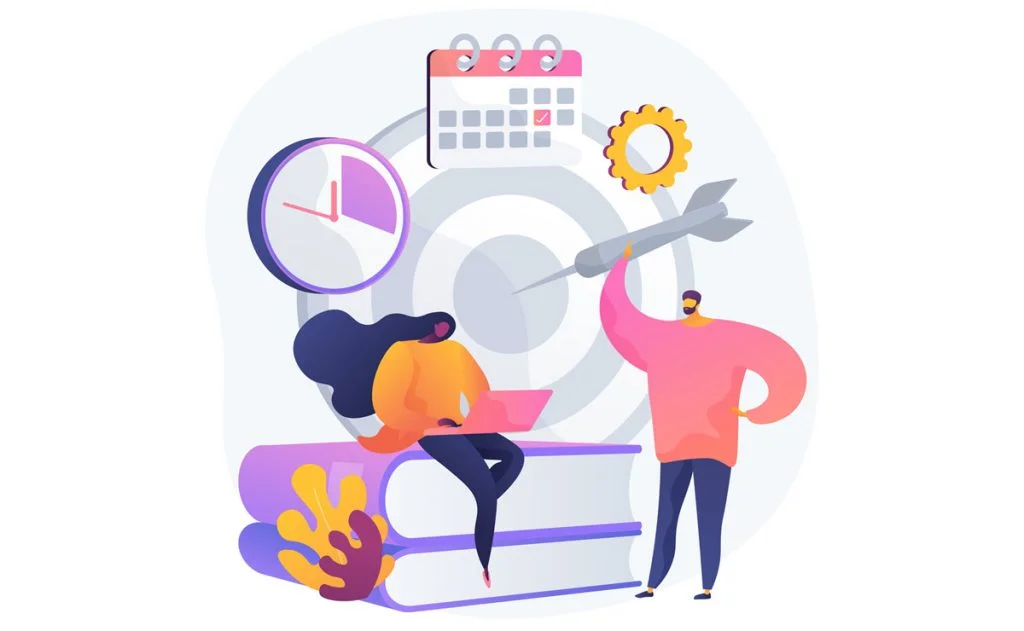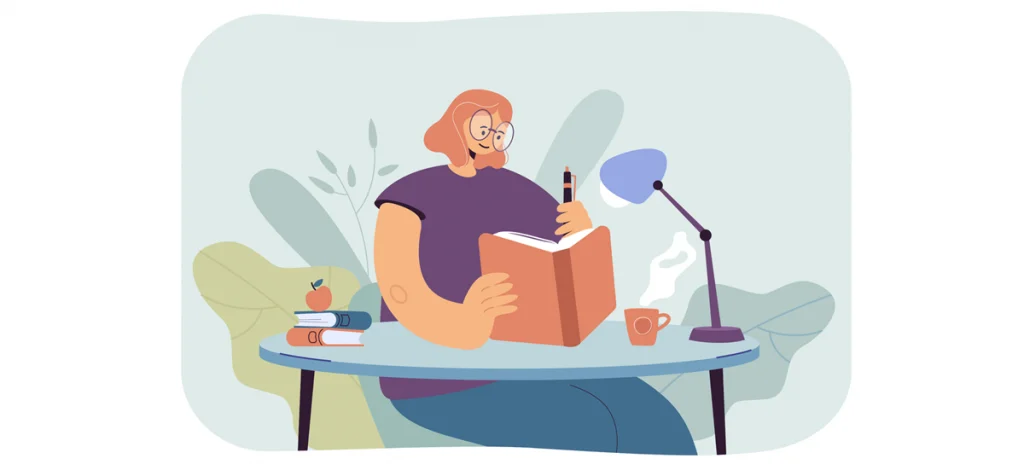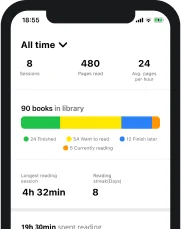There are many benefits of reading books, including intellectual and psychological capacity increase. Every single book you read offers you endless opportunities of exploring and learning new ideas. When you read, you gain information and knowledge and you have a plethora of other benefits as well.
Now let us explore the most important advantages of reading, whether you like novels or non-fiction books.
What are the benefits of reading?
Whether we choose the traditional reading format of paperback and hardcover books or if we go for modern solutions like audiobooks or e-books, there is no question about it: reading has a ton of benefits for us.
Ever since the first-ever written novel, The Tale of Genji by Murasaki Shikibu, people haven’t stopped reading fiction, and there are many reasons behind this. Reading is a fun activity, one that can help you relax and feel better after a long day, it gives us a way to escape our daily routines and troubles, and provides us with endless learning possibilities.
Reading is equally effective in boosting both our physical well being and our mental health and is appropriate for people of all ages.
Because we know you’re interested in finding out as much as possible about how your hobby can improve your life, you will find below detailed explanations about each separate benefit, split into relevant categories.
1. Reading helps your vocabulary
According to researchers, children who regularly read books at an early age develop large vocabularies in the long run. When the child has the benefit of vocabulary, they affect their academic success by passing the different set tests, eventually getting college admissions, and having vast job opportunities.
Many employers are looking for people with soft skills, such as communicating clearly. The benefits of reading books include exposing the reader to new words directly from the read context and increasing your soft skills.
Vocabulary growth is an inevitable consequence of reading. The more you read, the more you expose yourself to new words that slowly become a part of your usual repertoire. This is probably one of the most relevant pros of reading books and one you should definitely learn to take full advantage of.
2. Reading improves communication and conversation skills
Reading gives you a lot to think about; hence you will continually have your mind wander and explore different issues and stories. This means that reading can help you become a better speaker.
Having a good imagination and quality vocabulary gives you an upper hand when constructing simple and complex sentences suited for different occasions like interviews and simple conversations.
Most readers find it easy to express themselves, and talking about their emotions and feelings or having simple conversations is an effortless thing.
3. Reading reduces stress
Whether it’s a novel or an article, a great story will distract you from daily tasks and issues. When you have your hands on a well-written novel, it will transport you to another realm, while an engaging article will keep you focused on the present; the tension you have is automatically drained away, allowing your entire body to relax.
In 2009, the University of Sussex carried out a study and found that there was a 68% reduction in stress levels by reading for only six minutes. How cool is that? A great book will have you venture into places where your stress levels can’t.
Stress management is an important part of our lives. We all have a lot on our minds at all times, we often feel overwhelmed by daily events, or reach a stage of complete burnout in our careers. Reading’s ability to reduce stress can be a great solution, a cheap and versatile alternative to other traditional stress relief tools.
4. Reading helps relieve depression
Scruton, a British philosopher, said that the idea that one can escape from reality is not imaginary consolation. Depressed people always feel isolated and alienated from others. Reading books and articles can help minimize these feelings.
Reading books can help you escape your world and experience the fictional adventures of the characters. At the same time, reading self-help books can allow patients with depression to better understand themselves and their symptoms, and the issues they are facing.
These self-help books are actually highly recommended by doctors and experts.
5. Healthy reading habits mean a healthier body
All readers will tell you that being immersed in a great book can stimulate the brain’s various functions. Different researchers have proven this and continue to support the different health benefits accrued from reading.
Reading also decreases heart rate and blood pressure and relieves muscle tension on top of the fact that it reduces stress. So reading is not just a beneficial activity for our mental health, it actually goes beyond that, also relieving the physical symptoms of the mental ailments it cures.
Also, on top of the ways reading helps us improve our mental abilities, reading also has a positive effect on the physical health of our brain. Being a complex form of exercise for our brain, it improves its functions and keeps it in top shape for longer. Reading increases brain connectivity and promotes healthier neuronal development.
6. Slows age-related cognitive decline
The National Institute on Aging highly recommends keeping your mind active by reading books, magazines, and articles as you age.
Although research isn’t yet conclusive, it’s clear that reading books helps seniors maintain their cognitive function and prevents the occurrence of different memory diseases like Alzheimer’s. A study carried out in 2013 by Rush University Medical Centre revealed that people who regularly engage in mentally stimulating activities were less likely to develop brain lesions and plaque build-ups linked to people with dementia.
7. Reading fiction makes it easier to empathize
Empathy describes the ability to understand or feel other people’s experiences and relate them to oneself. It is a skill that can be learned and practiced daily.
When reading the character’s thoughts and feelings, it becomes clear what it’s like to be a part of their story and learn to live like another person with a whole different view of life than yours.
The reactions you have to certain events in a story mostly vary from those of the character’s. This is great for the reader as it lets them experience the emotions of the other person.
Reading a book helps develop empathy as your brain directly learns how it feels to be in someone else’s shoes. When you can apply the earned knowledge in real life, you will have earned a new superpower.
8. Reading can improve imagination
To read a fiction book, one has to have the capability to imagine its contents. Your imagination can evolve and have various impacts on your daily life.
When most people think about imagination, they easily relate it to art or children. It could be their drawings or a composed piece of music.
When you read a book, you picture the entire novel clearly identifying all the characters as the storyline and this stimulates your brain. Imagination consists of all things that do not involve our past or our present.
9. Fiction helps improve memory
Reading fiction helps improve memory. Fictional stories are full of details that can help people remember long-term goals and actions. As you read each chapter of the fictional story, you have to remember the characters, conversations, plot, and more.
Your brain can improve your memory function by training it to convert information into long-term memory. It is scientifically proven that reading books will slow down memory decline in your senior years.
Your brain functions like any muscle. It needs regular exercise to improve. The advantages of reading novels and other publications improve your memory by stimulating different parts of your brain and enabling it to create new and better connections.
Visualizing information helps improve memory.
Another study involved analyzing the brain scans of subjects from participants who were reading a novel. When the storyline became more intense, the brain scans indicated more activity in various parts of the brain.
They continued to monitor the participants’ brain activity for several days after they finished the novel and the results showed improved memory and brain activity.
Give Your Reading Experience
An Extra Boost With Basmo
Track the books you read, monitor the time you spend reading and keep notes on your reading habits and how it makes you feel. You can set yourself targets for the time you spend reading and you can get notified whenever you’re behind on your reading time.
10. Reading promotes inclusivity
Reading different fictional books helps you be more open-minded, inclusive, and tolerant. When you easily understand and relate to another person’s story, you will improve your attitude toward stigmatized individuals and communities.
Books can open up your mind towards understanding different life phenomena and minimize the negative perceptions we have towards people. Students who read about discrimination are more inclusive, and decisive, and rarely discriminate against other children; this also applies to adults.
11. Reading fiction can make you happier
Reading fictional publications is a relaxing and healthy thing to have in your life. As stated earlier, reading helps you minimize stress levels and distract you from any form of negativity. There are different scientifically proven advantages of reading books, and all of them trickle down to the fact that books will make you happy.
When you take your time to read your favorite book it automatically lifts your spirits making you feel great. A survey carried out among the UK population consisting of 1,500 adults found that 76% of the sampled population indicated that reading improved their life and helped in making them feel great.
Reading different magazines, articles and books stimulate the brain to release endorphins, oxytocin, serotonin, and dopamine which are happy hormones, making the reader feel worthwhile, pleasurable, and happy.
12. Reading helps you become more tolerant
Fiction stories deal with diversified topics and you can learn a lot from them about being more tolerant.
As I already mentioned, reading relaxes your body and mind. Being less stressed means you’re in a better general state of mind which allows you to better accept those around you.
Not only that but exposing yourself to different life stories can help you better understand the struggles of other people and project your knowledge into your everyday life.
13. Fiction novels can improve analytical skills
There are different ways in which reading fictional books will help you improve your analytical skills. The brain is constantly trying to sort and organize information and reading simply makes it better at it.
While following the story’s plot or imagining the possible ending, you indirectly train yourself to organize, sort, manage, conceptualize, visualize and manage information. Research and data analysis to fill in the book gaps enable the reader to have the empirical ability of analysis at all times. Not only is it beneficial for your brain to read various fictional books, but it’s also fun!
14. Non-fiction teaches you facts
Reading non-fiction teaches you concrete facts, instead of letting your imagination wander in imaginative universes. Whether it’s a history book or a book exploring a certain topic you’re interested in, non-fiction provides you with accurate information or allows you to develop practical skills, things you can use later in life.
15. Reading can expand your thought process
One of the advantages of reading non-fiction is the fact that it activates the part of your brain responsible for analytical thinking. This helps you improve your thought process, allowing you to better understand real-life concepts and making it easier for you to form your own opinions about things.
Better thinking skills are, without a shred of a doubt, important. You can benefit from them with better work performance, the ability to learn quicker or to simply remember things more easily. Add your improved communication skills to the equation and there’s no denying the fact that you’ll be a lot better at debating your own beliefs.
16. Non-fiction teaches you to structure information
Since non-fiction is based on facts and is often a great source of knowledge, the writing is usually structured differently than fiction. Having to understand headings, subheadings, lists and graphs or diagrams will help you store the data in your brain in a similar way.
Improving the way you structure and compartmentalize information will be incredibly helpful in your day-to-day life.
17. Reading novels is good for you too
Reading novels can help develop your social skills and shape your brain. People and children who read novels score better in various tests like empathy tests and increase one’s ability to connect with others.
A study conducted in 2010 revealed that children exposed to reading novels and stories have a stronger ability to model the mentality of other people.
In another study, published in 2009, Oatley found that reading novels improved people’s social skills, including agreeableness, openness to various experiences, emotional stability, extroversion, and emotional awareness and stability.
18. Reading gives you a chance to live longer
A study was carried out to determine the life span of readers and non-readers from the adult population. The adults who actively read books were more likely to live longer than those who did not, with a difference of two years.
The study also found that people who read more than 3 hours a week lived longer than those who were not enthusiastic readers. The study also indicated that reading magazines and other means of media were not as efficient as reading novels.
19. Reading gives you better focus
Reading novels is considered beneficial and a requirement for literacy development. Reading can help improve a child’s or adult’s ability to focus.
While reading, your mind is engaged in a healthy activity. Your brain is working on absorbing information, remembering details, and following the storyline. This is a great exercise for your brain.
On top of this, keeping your mind occupied with the plot of the story trains your brain the ability to focus on a task for longer periods of time.
20. Novels are a form of healthy entertainment
Among the best-known benefits linked to reading novels is that it is a great source of wholesome entertainment. All the books you will pick and read offer different stories and information, and you can carry your book and read it at your favorite location, like by the pool, on your couch, on the beach, and before you sleep.
You will unlock endless opportunities when you get into reading books as your favorite form of entertainment. By reducing stress levels and learning to focus and analyze different situations, you will lead a quality life.
Today, there are loads of unhealthy entertainment sources mainly from electronic media like movies and games easily accessed from your computer, television or smartphone. Electronic devices produce blue light which has negative impacts on our eyes. When you focus on reading books you will reduce the amount of blue light that may be received from staying on the various social media platforms or other devices.
21. Reading improves sleep quality
When you open a book and get thoroughly engrossed in it, you will have opened up your imagination and that helps you enter a state of consciousness that is unaltered.
When you have your mind engaged in literary escape, tension is removed, and your body prepares for slumber. People who read before going to bed usually enjoy a deep and quality sleep. Introducing reading to your bedtime routine is generally not difficult and it can be a great way to replace watching TV or other activities that could actually have a negative effect on your sleep.
22. Less stress
When you are lost in a book, your focus is on the plot, and you no longer focus on the problems you are facing; hence your heart rate, blood pressure, and muscle tension are lowered.
It is, however, advisable to carefully choose the genre of book you want to read; horror, mystery, and thriller books might be fun to read, but the plot and suspense levels might keep you awake for longer than you wish. Choose inspirational and calming books that always have positive impacts on your mood.
23. Reading novels could prevent insomnia
Insomnia is caused by different factors like increased stress levels and other medical conditions, and it makes it extremely difficult or even impossible to fall asleep. While our general well being is generally closely linked to the quality of our sleep, it’s easy to understand why being unable to sleep can be a huge issue. So, the first thing you should do in order to get rid of insomnia is to learn how to reduce stress.
Reading a book before bed helps reduce anxiety and stress levels, which have been found to be some of the reasons behind insomnia.
On top of this, reading increases the levels of serotonin and melatonin, which could help patients with insomnia get in the right mood to fall asleep.
24. Reading can improve writing skills
The more you read, the better your writing skills will become. That isn’t just because reading improves your vocabulary, but it also exposes you to an infinity of ways to arrange your words to form sentences that are more beautiful and easier to understand.
Whether you believe it or not, a lot more in your life depends on your ability to write. Good writing skills are not only essential for writers. Unless your life is completely different from the lives of the vast majority of people, you communicate on a daily basis in writing: you text, write emails, and you IM.
The better you express yourself in writing, the easier it is for you to achieve more, regardless of what that means for you.
25. Reading can be a form of therapy
Bibliotherapy is a form of creative arts therapy that uses books to help aid people overcome certain conditions. These can vary from chronic stress and anxiety to depression and substance abuse recovery.
It is a cheap, non-invasive, and effective form of therapy that is being used increasingly more often in the past years. And for good reason: reading doesn’t only reduce stress, it works on so many more levels in helping people become the best version of themselves.
26. Reading helps you think outside the box
By constantly stimulating your imagination and helping you develop your thinking skills, reading is ultimately going to allow you to think outside the box more often.
Reading boosts creativity and has a positive effect on the way you are thinking. If we add this to the obvious improvements in general knowledge it also generates, it’s quite easy to see how reading can work wonders for the way you come up with solutions.
Good reading habits are ultimately going to help you make decisions quicker and better, come up with more creative ways to solve problems, and give you a boost in terms of thinking on your feet when push comes to shove.
27. Reading boosts emotional intelligence
While reading comprehension is directly related to the amount of information from books you actually get to retain and later use, there are some other more subtle ways in which reading can change you. Reading doesn’t just make you smarter.
Emotional intelligence is defined as a person’s ability to perceive and correctly analyze those around them and the emotions others are feeling. In other words, a person with a high level of emotional intelligence will find it a lot easier to walk in someone else’s shoes.
People with high emotional intelligence are usually quite successful in their area of expertise and manage to reach top positions in the companies they are working for. Reading can increase our level of empathy and exercise our minds in a way that improves our emotional intelligence.
We get “behind the scenes” with each character we read about and we learn how and why they think and act the way they do. This provides us with a virtual life experience that is invaluable.
28. Reading can help you burn some calories
Granted, you won’t burn nearly as many calories as you would on a brisk walk or a jog, but the fact still remains that reading does help you burn more calories than you normally would sitting on the couch.
Every action we perform (consciously or not), burns calories. Whether we are simply breathing, talking, or thinking, our bodies use energy to perform these tasks. Reading, being a rather complex mental activity, requires quite a lot of resources (processing power if you will), which in turn will need to be fueled by calories.
That being said, while there are several different schools of thought on this matter, the common denominator seems to be that reading can burn up to 150 calories in 1 hour and 45 minutes.
Bottom Line
In conclusion, reading can improve your life in many ways, and the reading benefits are undeniable. Among the most powerful weapons you can ever have in the world is a book, as it gives you a chance to explore the different possibilities in the world and be inspired in the process.
And if you’re looking to give your reading habits a boost, we strongly advise you to try the Basmo app. It’s a great tool, compatible with most mobile devices out there, which allows you to keep track of the books you read, have read, or want to read. On top of this, it helps you keep track of your reading sessions (time spent reading, pages read), and allows you to set reading targets and even reminders so you never skip your reading sessions.







